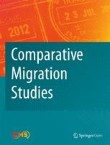Editorial
Who needs integration? Debating a central, yet increasingly contested concept in migration studies
Integration is a pivotal concept in migration studies. Yet, over time critiques have been formulated that question the very assumptions that the concept of integration rests on. Willem Schinkel, one of the major criticasters explains what is wrong with the concept. Is it that bad? ...
Sawitri Saharso
Comparative Migration Studies 2019 7:16
Published: 1 May 2019
Original Article
Against 'immigration integration': for an end to neocolonial knowledge production
This paper, written on invitation by the editors of Comparative Migration Studies, is intended as a provocation piece for invited commentators, and more broadly for those working with, or concerned about, the ...
Willem Schinkel
Comparative Migration Studies 2018 6:31
Published: 25 September 2018
Commentary
Integration: twelve propositions after Schinkel
By way of a commentary on Willem Schinkel’s ‘Against “immigrant integration”: For an end to neocolonial knowledge production’ in this volume, I propose twelve propositions in order to rethink the academic use of the concept “integration” in contemporary migration studies.
Adrian Favell
Comparative Migration Studies 2018 7:21
Published: 16 May 2019
Commentary
Immigrant integration: the governance of ethno-cultural differences
This commentary is a reply to the article ‘Against immigrant integration’ by Willem Schinkel. It argues that rather than abandoning immigrant integration as a field of research, we have to continue to strengthen critical approaches. Immigrant integration has to be understood and analyzed as a governance technique...
Leila Hadj Abdou
Comparative Migration Studies 2019 7:15
Published: 30 April 2019
Commentary
Of straw figures and multi-stakeholder monitoring – a response to Willem Schinkel
This article is a response to Willem Schinkel’s provocation piece. While mostly agreeing with Schinkel, my response questions Schinkel’s commitment to losing immigrant integration as an object of analysis. I point to the integrationist logic with which Schinkel assaults superdiversity, to more broadly question how prescriptive a social science that is ‘against immigrant integration’ should be.
Fran Meissner
Comparative Migration Studies 2019 7:18
Published: 13 May 2019
Commentary
Relational integration: a response to Willem Schinkel
In this essay, I respond to Schinkel’s recent statement that ‘any claim and practice that concerns ‘integration’ should be the object of research, rather than the project of research’ (2018, p. 8). Although I agree with Schinkel that there are problematic practices of integration research, I do not agree that integration cannot be used as an analytical concept ...
Lea M. Klarenbeek
Comparative Migration Studies 2019 7:20
Published: 15 May 2019
Commentary
Problems of and solutions for the study of immigrant integration
In his contribution, Willem Schinkel makes critical observations on the concept of immigrant integration and its use in Europe, specifically in the Netherlands. Three of these are agreeable: there is a lot of fuzziness around the concept...
Rinus Penninx
Comparative Migration Studies 2019 7:13
Published: 16 April 2019
Commentary
Migration studies: an imposition
This is a rejoinder to the responses made to my paper ‘Against “immigrant integration”: For an end to neocolonial knowledge production’, which was based on my book Imagined Societies. A Critique of Immigrant Integration in Western Europe (Cambridge University Press, 2017). Here, I aim to push the boundaries...
Willem Schinkel
Comparative Migration Studies 2019 7:32
Published: 01 August 2019
